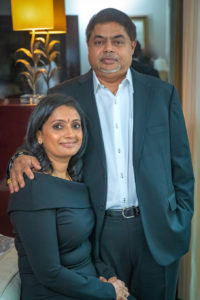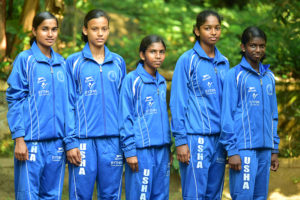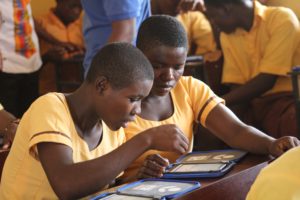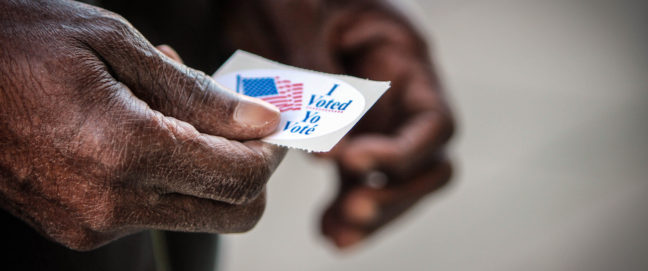
‘We are not an organisation who will give funding and then sit back and say ‘OK, this is done.’ We want to be involved.’
When Vijay Eswaran founded the QI Group of Companies in the 1990s with a number of partners, one of its premises was that some of its profits should fund social initiatives. Later, and with QI grown into a multinational concern, with offices in Hong Kong, Malaysia, Singapore, Thailand the Philippines, this principle was institutionalised in the RYTHM Foundation, based in Malaysia but operating internationally. Vijay and his wife, Umayal, who runs the Foundation, explain the derivation of the name (which is not a mis-spelling), the ideas behind this ‘built-in’ CSR – and why they no longer refer to it as either CSR or philanthropy. They also talk about the alignment of the Foundation’s work with the Sustainable Development Goals (SDGs) and their hopes – and fears – for the Goals’ achievement.
Could you tell me how RYTHM Foundation got started?
Vijay: When we started the company, one common view among the partners was to make sure that we incorporated within it a way to pay back to the community – worldwide, as well as where we live, because we are very much a worldwide organisation. So we incorporated in the first company that eventually grew into a group a philosophy that 10 per cent of our revenues would flow back into what at that point we called charity but became what I suppose is now known as CSR.
And the Foundation now channels that 10 per cent?
Exactly. When you get into CSR, it’s a whole new field. We found that out the hard way and one of the things we recognised after having contributed through intermediaries for the first five years was that the bang for our buck was lost along the way – I’m talking about some of the major organisations in the world that we supported. Without naming names, 25 cents on a dollar would be very good if it reached the end-user. Having learned that, we decided to do it ourselves and the Foundation was born.
Rather than being in a corner doing small things on our own, we wanted to be aligned with a bigger agenda
And that 10 per cent holds, so how much the foundation has to spend depends on how well the company is doing?
Yes, and fortunately the company has been growing steadily for the last twenty-odd years so the foundation has a growing budget to play with.
The RYTHM ethos appears to be the principle that governs both the work of the company and of the foundation. Can you tell me where it comes from?
Yes, that’s very much the case. RYTHM comes from a story about Gandhi. Gandhi was a point where the founders of the company met because we were a pretty international bunch of people and we were looking for somebody or something that represented our common beliefs, someone who belonged to the planet rather than a citizen of one country. It was very natural for us to look at his values and recognise that our values were exemplified by his life.
When Gandhi was in South Africa, volunteers would come and offer their services at his ashram. One day, he came across a young man who was sweeping the courtyard. He asked him where he came from and the young man said he had dropped out of studying engineering at university to serve the Gandhian cause. Gandhi told him he had more than enough labourers. What was needed were engineers, lawyers, doctors and people with specialist educations. So he told him, ‘go back, raise yourself, come back and together we will help mankind.’ So RYTHM – raise yourself to help mankind – comes from those closing words.
Umayal, the Foundation’s website lists education, employment, gender equality and sustainability as the main focus of its activities. Presumably, they develop from the RYTHM idea?
Umayal: Yes, education and empowerment are critical pillars for us, though it’s not how we started. For the last 10 years or so, we’ve been doing whatever came our way and we realised that that approach wasn’t going to work. If we want to see an impact and to bring change, we have to focus. So, last year, we had a strategic planning exercise and we’ve aligned with some of the SDGs that we identified as close to our focus areas – that’s how we came up with education, gender equality and community development, and we’ve also chosen to work through smart partnerships with grassroots organisations.
I think the best we can do is what we think the communities we are working with need, that’s why we trust the grassroots level organisations
Why did you choose the SDGs? Was it because it’s a big framework that’s already there?
Rather than being in a corner doing small things on our own, we wanted to be aligned with a bigger agenda, because the UN has done the research and they know the areas where they want the private sector to work with governments. We’re also concerned about impact because there’s no point us keep doing something if we can’t measure its impact, so we don’t do ad hoc projects any more. We take projects on for a minimum of three years and we monitor them throughout. They send us periodic reports and funding is paid in instalments on the basis of targets met. We do a monitoring visit and sometimes on the basis of that, we suggest that they do some of the things a bit differently. For example, we started a project with an organisation in India tackling infant mortality. One of our project managers visited and realised that they don’t have basic sanitation in the area, so we have suggested they focus on that and we are working with another organisation to build affordable toilets in that community. That’s a major problem and we have to solve that before we can tackle child mortality. We can only do that if we work with an organisation for three to five years because that’s what it takes in order for them to become sustainable, independent and able to meet community needs.

Taarana, which means ‘awakening’ in Sanskrit, was established by RYTHM Foundation in 2011, as a centre for children with special education needs.
Does that sometimes create tension between the NGOs’ own agenda and what they see as yours?
Vijay: That can happen in some cases because some organisations tend to be politically driven and we are not. But we have been on the ground since 2005 and we work with a number of different types of organisations in many countries. This has helped us establish credibility. Typically, as Umayal says, our partners are grassroots organisations who are just trying to help make their communities better, and are open to change.
Just going back to the SDGs for a moment, we were in New York last year during the UN General Assembly week attending a summit called Concordia which was a meeting to foster and sustain cross-sector partnerships for social impact. We also attended a UN Global Compact meeting on the SDGs. We were pleasantly surprised at what they had been doing and what they had achieved. For once, I think the UN is actually doing some seriously good work and the SDGs with which we have aligned our work are the ones we are in total agreement with.
And that presumably reinforced your view of the value of the SDG framework?
Absolutely. We met some people at that group who were very like-minded.
How optimistic do you feel about the SDGs?
The Goals are lofty, let’s put it that way, and they need to be there. In terms of deep activity, it depends very much on the political will of individual countries.
Umayal: I was surprised to hear at one of the sessions at Concordia that the main question is not lack of funding – it’s who gets it and where? Who’s going to implement these great ideas? And on that, nobody has the answers. I think the best we can do is what we think the communities we are working with need, that’s why we trust the grassroots level organisations in those countries. I think the SDGs are good indicators of what to look at. What they can achieve, that remains to be seen.
‘When you go into countries where you don’t understand the dynamics, you have to work through partnerships on the ground. It’s been good for us…’
Vijay: In practice, we’ve found it’s the politics involved that muddies the waters. The session in Concordia was very enlightening because around us were some of the largest sources of private funds in the world – trusts and family offices and so on – and they were ready and willing to provide the money that would have closed all the current estimated funding deficits but, as they said very frankly, they lack faith in the organisations in question to carry out the necessary work. It’s a political issue and not just governmental politics, but also politics at the UN level, at the level of multilateral organisations. So, at the end of the day, a lot of private organisations such as ours, prefer to do this ourselves and make sure that at least the funding we have reaches the end-user.
So it’s lack of faith in intermediaries, not just governments – in multilateral and bilateral institutions and international NGOs?
Exactly. The bottom line is that, the bigger they are, the more unwieldy they become and the more politics is involved. The money needs to reach the people who need it.
So there’s a whole tier of organisations which is basically the stumbling block?
I would say so, absolutely.
The Maharani initiative is obviously a major one for you, Umayal, could you tell me briefly what it is and how it works?
Umayal: We started Maharani, ‘the princess in you’, in 2010 because of the mindset we saw among girls in Malaysia who came from very poor families. Basically, they don’t have dreams or aspirations. They tend to drop out of school, go and work in factories or low-paid jobs, get married very young and have children, and that’s it. So we saw that if we could give them a different set of values, they would understand that they are no less than anyone else. Initially, we created a camp over three days, which encourages girls to explore their unique identity and to question limiting beliefs about themselves. We’d talk to them about education, their future, teach them life-skills and basically give them self-confidence.
We aren’t doing this to assuage our conscience or to fulfil a duty of some sort. We are doing it because we believe that every corporation, particularly in this age and time, needs to have as one of the grounds of its existence the ability to contribute to the society it has come from.
The second year, we got approval from the ministry of education to go into schools, and we went into different states in Malaysia and ran camps every month. To date, we’ve reached about 7,000 girls. We don’t take big numbers, we only take about 100 at a time. In 2015, we established a centre, the Maharani Learning Lab, which provides a safe, after-school space for these girls to participate in various self-development programmes and academic coaching and we’ve now come up with a blueprint for the scheme, so that any organisation can run their own version of the programme. Next week, we will be signing an MOU with YWCA in Malaysia.
So you’re scaling up the initiative?
Yes.

The Maharani Camp for provides opportunities for young girls from underprivileged backgrounds in Malaysia to learn and develop soft skills.
You’ve talked about the importance of partnership. Could you describe how you find partners and work with them?
When you go into countries where you don’t understand the dynamics, you have to work through partnerships on the ground. It’s been good for us because wherever we have programmes outside Malaysia, it’s a partnership which means we have to build trust with these organisations and we do a lot of work to make sure they understand the issues locally and have been around a number of years, and we look at what they’ve achieved. I think it’s the smart partnerships that are going to provide impact, because no one organisation can do much alone. For example, in Malaysia, there are a lot of small organisations doing the same thing. If we could put our heads and our resources together and come up with just one programme, that would have more impact. That’s what partnerships bring for us.
You’re talking about partnerships with implementing organisations. You don’t have partnerships with other funders?
No, we don’t.
Sometimes you run your own projects and sometimes you work through others. How do you decide which option to take?
Vijay: In our backyard, Malaysia, we are very confident that we can run the programmes ourselves. However, as Umayal says, when we go abroad and we work in, say, Cambodia, in Myanmar, in India and especially now, in Africa, we have to work with groups that are well established there, so it has to be some kind of partnership.

RYTHM Foundation recently partnered with Usha School of Athletics, who nurture and train promising female athletes in India.
How do you choose the areas you will work in?
It’s more to do with the partnering organisation – where we find a partner we are able to work with who is not only competent, but has the level of integrity we are looking for, then we start to work with their programmes as well as they with ours. In Cambodia, we built a school and in Myanmar, we built a computer lab – these are both in partnership with one group that is working in Indo-China.
Umayal: Basically we are a networking company so we work with communities where our businesses are because we believe in giving back in those communities, so that is a priority but we also look at other regions and, as Vijay said, we see worthy projects and get involved.
Do people come to you or are you actively looking for them?
Vijay: Sometimes people come to us. As an example, we met a group at the World Economic Forum who presented a concept for providing power sources for off-grid villages in the Himalayas. They bring in solar panels, set them up, teach the villagers how to maintain them, and those panels will give 6-8 hours of power in the hours of darkness, enough for them to run lighting and to have internet capability, which changes the entire nature of the village. We like the project so we’ve backed the group that implements it and we’ll keep on doing so.
For us, it’s not necessary for anyone to recognise or even know what we’re doing. A case in point is that we call upon our employees to participate, not in terms of giving money, but time, so they are required to do so many hours of CSR activity a month and many of them, much to our surprise, do a lot more.
So the projects we support are either something that connects with us on a commercial level, in terms of us being active there, or it connects with our pillars – environment, education, community development and so on. The solar panel project connected with us on many levels. It taught the villagers to work together, it has a clear environmental connection and an educational connection, too, because now the children can use laptops which have become effectively their school.
Earlier you mentioned CSR. Is that your preferred term for your social initiatives?
Umayal: Actually, we now call it QI Social Impact Initiative, we don’t refer to it as CSR.
And you don’t look on yourselves as doing philanthropy?
No, we are not an organisation who will give funding and then sit back and say ‘OK, this is done.’ We want to be involved.
Vijay: The heart of the matter is the word ‘philanthropy’, which to me is a derivation of charity. We aren’t doing this to assuage our conscience or to fulfil a duty of some sort. We are doing it because we believe that every corporation, particularly in this age and time, needs to have as one of the grounds of its existence the ability to contribute to the society it has come from. For me, governments are not the best instruments for going out to help people. We have seen them fail too many times. Being a corporation, we have systems that are a lot more efficient, because in order to make profits, we need to be lean and mean and those skill-sets also apply when we go into the social arena. We are able to do this far more effectively than the cumbersome so-called charitable organisations. Philanthropy seems to imply that it’s something that royalty does. We look on it as a duty, in fact it’s part of our rationale as a company.

‘The Gandhian principle is that of non-violence and we have very strict rules in not being involved with or buying products from companies, like the armaments industry.’
Gandhian principles are important to the company and the foundation. Do you ever find any conflict between the world of business and those principles?
I speak at various forums around the world, like WEF and ASEAN forums, so I can see a little of what’s happening on a global scale. In my perspective, companies that have been around for half a century or more have a different viewpoint from those of us that have begun within the last two or three decades. I guess companies that began after World War II were very profit-driven and they created the guidelines for the early network of CSR strategies, but that too is changing. If you look at the companies that began around the 90s and onwards, you will find the attitude is entirely different. When we sit around a table together, we look at ways and means we can combine resources, there’s no hostility, no ‘your turf, my turf’, there’s a lot more openness in discussing things of this nature. Perhaps we might call it the attitude of the millennial companies.
For the older companies, CSR is seen as a way of managing public relations. For us, it’s not necessary for anyone to recognise or even know what we’re doing. A case in point is that we call upon our employees to participate, not in terms of giving money, but time, so they are required to do so many hours of CSR activity a month and many of them, much to our surprise, do a lot more. We have 42 offices around the world and around a thousand employees, many of whom are involved in local projects.
QI is a vegetarian organisation. Is that in accordance with Gandhian principles or is it more to do with environmental sustainability?
It’s both. The Gandhian principle is that of non-violence and we have very strict rules in not being involved with or buying products from companies, like the armaments industry, that accept or foment violence. At the same time, the environment has clearly become a primary focus of ours over the years and we have a no-single-use-plastics policy throughout all of our companies, which has changed our practices radically, even down to the way employees bring their lunch to work. We’ve done this within the last couple of years. But being vegetarian has been there for 20 years.
We are not an organisation who will give funding and then sit back and say ‘OK, this is done.’ We want to be involved.
How much support do you feel there is for the work you’re doing in Malaysia? Is there an ecosystem, a CSR umbrella organisation for instance, or is there governmental support in terms of tax incentives?
There’s a greater awareness. The change of government has brought more light into the area. It’s a long way from where it should be but it’s certainly better.
Any kind of CSR Forum?
Umayal: No. I think for a lot of the private sector in Malaysia, their version of CSR is a one-off event, so the norm is that the admin or the HR department organises it. I think we are one of the few here who have done the strategic planning and have a specific department. It’s changing, but it’s changing very slowly. What I would like to see is breakfast sessions where like-minded people get together and share ideas so we can focus and do the same thing on a bigger scale – but we’re not there yet.
Andrew Milner is associate editor of Alliance magazine




Comments (5)
Congratz for your mananimity towards the needy and poor people; may god bless both of you dears!
Very idealistic & practical manner of doing CSR, which is i think a rare deal to do it without wanting to "show-off" too. God bless QI grp & Rythm Foundation all the more.
Kudos to you guys, that you created such a fantastic institution
Wonderfull, this is the way CSR is done, God Bless Dato.
Really superb.. Loved it....